The actions of the NKVD troops on the protection of the rear in the liberated countries of Europe
In the summer of 1944, the Soviet troops cleared most of the enemy-occupied territory from the Nazis and fought in the countries of Central and Southeastern Europe. In the areas liberated from the German troops, a significant number of small groups created from defeated enemy units and formations remained, which continued to provide armed resistance. They hid in the woods, attacked subunits of the Soviet Army and individual servicemen, raided localities, robbed, killed and terrorized local residents.
The war was nearing its end, but the enemy continued to put up fierce resistance, threw spies and terrorists into the front-line strip, sent saboteurs to the main railways and highways with the task of disrupting military transport, hinder the actions of the Soviet troops.
Fearing retribution for the crimes committed, traitors who served in punitive bodies and various nationalist gangs tried to flee to the west. Some of them, on instructions from German intelligence, continued to operate in the territory liberated from the invaders.
In such a situation, the protection of the rear areas of the advancing fronts assumed great importance. By the beginning of the operations of the Soviet Army for the liberation of European countries, the NKVD troops for the protection of the rear had a coherent organizational structure, necessary armament, and accumulated considerable experience in dealing with various gangs, spies and saboteurs. The leadership of the troops was carried out by the Main Directorate of the NKVD troops for the protection of the rear of the acting army through its front controls, which subordinated regiments (usually one regiment for each army of the first echelon) and separate maneuverable groups.
In close cooperation with parts of the army, the troops of the NKVD for the protection of the rear (BOT) in the period under review successfully solved the following tasks: the protection of front-line and army communications, ensuring order in the front line; the fight against enemy agents, sabotage and reconnaissance and bandit groups; protection of the local population from the gangs of the enemy; carrying the checkpoint and barrage services. Often, HERE was involved in active combat operations along with units and subunits of the Soviet Army.
During the Yassy-Kishinev operation, the situation in the rear of the troops of the 2 and 3 of the Ukrainian fronts was rather complex. Local pro-fascist authorities in the northern regions of Romania, who were liberated from the Germans by the Soviet Army, resigned their official posts. In localities, the local criminal element created gangs that were engaged in looting and pogroms, and the sabotage and terrorist groups left behind by the enemy became more active. The work of the organizations was significantly hampered, since the anti-Soviet forces in Romania at that time were still very strong. All this hindered the normal activities of our troops, forced the Soviet command to take the necessary security measures.
Troops of the rear of the 2 of the Ukrainian Front included 10, 24, 37, 128 of the frontier regiment and 107 of the separate maneuver group. HERE 3 of the Ukrainian Front consisted of 17, 25, 91, 134, 336 of the frontier regiments and 109 of the separate maneuverable group. These units repeatedly had to engage in battles with scattered units of the regular troops and sabotage and reconnaissance enemy groups. Some of them were extremely fierce, especially near the front line. So, in August-October 1944 of the year, on parts of the troops of the NKVD 2 of the Ukrainian Front had 142 fighting with enemy forces. During this period, only the 37 frontier regiment (commander lieutenant colonel VP Yaroslavsky), who was guarding the rear of the 52 army, destroyed more than 1700 and captured 720 prisoners and officers of the enemy. Such an episode is interesting. Once a group of border guards regiment under the command of Lieutenant Colonel Goncharov, given the beginning of ferment in the Romanian army, in the area with. Palanca went to the location of the Romanian artillery regiment and inclined its commander to surrender. Within hours, the regiment was completely disarmed.
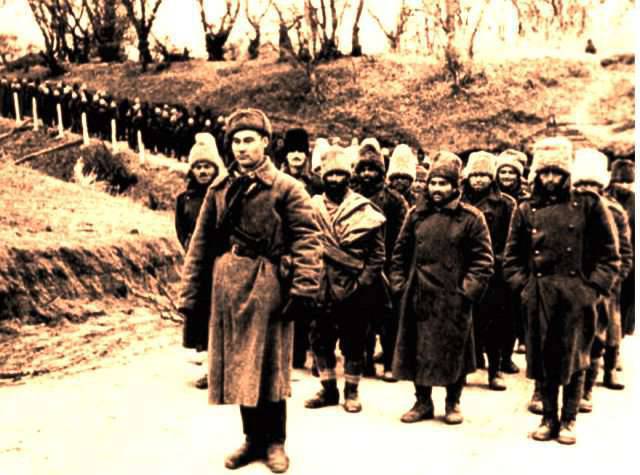
31 August The 2 Battalion of the 10 Border Regiment (commander Lt. Col. II Kashkadamov), commanded by Captain Alekseyev, defeated the remnants of German troops near the town of Vaslui, in particular, the combined officer battalion of the enemy, who tried to break through the front line. In a fierce battle, 230 was killed and 112 captured by German officers.
The 24 frontier regiment guarding the rear of the 27 Army successfully completed the search and liquidation of a large enemy sabotage and reconnaissance detachment, consisting of officers and noncommissioned officers, who attacked the hospitals and automobile columns of the Soviet Army. As a result of the battles, the regiment destroyed 155 and captured 145 enemy officers. In just three months, from August to October 1944, the regiment conducted 87 battles in which almost 1100 German soldiers and officers were destroyed and captured. Regimental sappers cleared 13 of enemy minefields, while disabling more than 4200 anti-personnel and anti-tank mines.
During the liberation of Bulgaria, part of the HTO of the 3 of the Ukrainian Front destroyed the remnants of the defeated enemy troops, its sabotage and reconnaissance detachments, carried the guard of the Danube crossings, helped the People’s Liberation Insurgent Army to maintain order on the roads and in settlements. The 134 frontier regiment of the NKVD troops under the command of Major N.A. Egorova, who was guarding the rear of the 46 Army. At first, this unit participated along with the Soviet Army units in the operation to liberate the city of Ruschuk, and then successfully eliminated individual enemy groups on the banks of the Danube, reliably providing security for the approaches to the military crossings. For active participation in the liberation operation of the city of Rushchuk from the fascist troops, the 134 border control unit 27 of September 1944 of the year was given the name of Ruschuksky.
The withdrawal of Romania and Bulgaria from the war on the German side created favorable circumstances for the liberation of Yugoslavia and Hungary. In battles on Yugoslav soil, the 91st and 134th border regiments distinguished themselves for protecting the rear of the 57th and 46th armies of the 3rd Ukrainian Front. So, the 2nd battalion (commander Major Blokhin) of the 91st border regiment, following the combat formations of the first echelon of the 57th army, entered battle on October 16 on the eastern outskirts of Belgrade. For three days of continuous fighting, the battalion, having broken the stubborn resistance of the enemy and repelled numerous counterattacks, managed to advance more than 2 kilometers and reach the area of the railway junction, sugar factory and road bridge across the Sava River. A particularly fierce battle broke out around the bridge, where the German infantry, supported by six tanks, 15 self-propelled guns and two batteries of six-barreled mortars made several counterattacks. In the early morning of October 20, a maneuvering group of the regiment and the 6th brigade of the People's Liberation Army of Yugoslavia arrived in the combat zone of the battalion. With a combined strike, they took control of the railway junction and the bridge over the Sava River. In the battles for Belgrade, the 2nd battalion of the 91st border regiment destroyed about 450 enemy soldiers and officers.
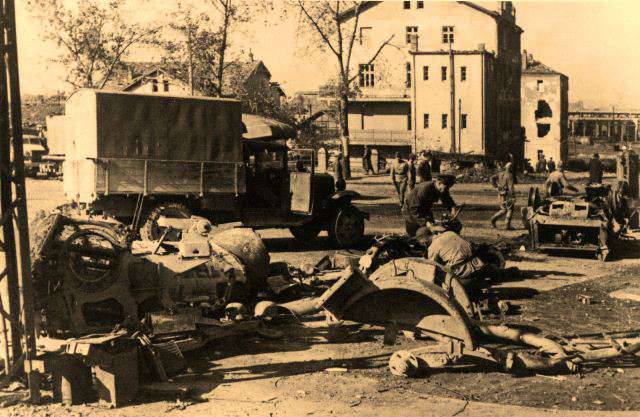
Active hostilities led part of the NKVD to protect the rear during the liberation of Hungary. They often had to join the armed struggle with German sabotage and reconnaissance detachments, as well as enemy units of regular troops. In three months of 1944, the BOT of the 2 of the Ukrainian Front was liquidated on the territory of Hungary by three major enemy sabotage gangs, the backbone of which were members of the fascist organization Nielash Kerestesh and officers of the SS forces.
In late December 1944 years 10-th pogranpolk with the assistance of the Hungarian patriots found and defeated the big subversive and terrorist enemy base, capturing 204 rifles, 10 machines, 6 light machine guns, 23000 different caliber cartridges, 80 antitank grenades, 120 kg of TNT, 446000 rubles.
For two days of December, 128 units of the Border Guard Regiment detained six agents of enemy intelligence deployed across the front line with the mission to mine and blow up bridges, set fire to warehouses with fuel and ammunition on the outskirts of the Hungarian capital in 1944 km from Budapest. On December 20, three German intelligence agents from the SS-Zuid-Ost fighter junction were arrested by the outfit of the 22-th Border Regiment near Lake Balaton. In the area of the town of Miskolc, 91, on January 7, by the 1945 frontier regiment, two groups of reconnaissance saboteurs were neutralized.
Part of the protection of the rear often engaged in active hostilities with the remnants of the enemy troops defeated by the Soviet Army. Part of the rear of the 3 of the Ukrainian Front fought especially hard during the liquidation of the surrounded German group in the city of Budapest and in repulsing the German forces ’counteroffensive at Lake Balaton. In these battles, 134, 336 (commander, lieutenant colonel SA Martynov) of border guards distinguished themselves, and 109, a separate maneuver group, commanded by Captain V.G. Gankovskiy. This maneuverable group of the NKVD destroyed more than 950 soldiers and officers of the enemy, and also captured more than 4000 people, disabled 29 enemy firing points, a mortar battery, 10 vehicles with ammunition and two observation points.
In battles for the Hungarian capital, the 1 th battalion of the 134 th frontier regiment distinguished itself (commander captain Zhukov). February 12 battalion liquidated in Boda a large group of the enemy, who tried to escape from the environment. Much of it was captured. Among the prisoners was the commander of the Budapest garrison, Colonel-General P. Wildenbruch.
The 336 frontier regiment also took an active part in the liquidation of individual enemy groups in Budapest. Only the 1 th battalion of the regiment for three days of hostilities (11-13 February) destroyed more than 970 and captured the order of 1400 enemy soldiers and officers, and only in the Budapest regiment destroyed 1911, captured 4143 man.
In battles in Austria, the 91 frontier regiment excelled. Separate his outposts, using the mountain-forest area, carried out deep raids into the enemy rear. The most successfully operated 9-I outpost. During the 12 day raid, she defeated the German garrison in the city of Mengeld, captured the ridge of heights in the Fischbach area and successfully defended them 5 days before the approach of the Soviet Army formations, then, together with the 68 Guards Rifle Regiment, held the mountain pass until they approached The main forces of the 4 Guards Army. During the battles for Veche, the 336 frontier regiment eliminated 14 of the sabotage and reconnaissance detachments and groups and captured more than 700 people of the enemy personnel.
In extremely difficult conditions, the active army had to act during the liberation of Poland. The 1 and 2 Belarusian, 1 Ukrainian were 13 border regiments and three separate maneuverable groups. Such a strong grouping of units for the protection of the rear was due to the complexity of the military-political situation in Poland, as well as the importance of the Berlin strategic direction in which the enemy concentrated the bulk of his troops and various operational-intelligence units. We should not forget that in the difficult years of the fascist occupation, the anti-Soviet-minded part of the Polish elite did not stop its policy against our country. In England, a Polish émigré government was formed, whose activity was directed not only at organizing the struggle against the Germans, but also at preventing pro-Soviet sentiments. This became especially noticeable from the 1944 year, when, at the suggestion of the Polish Workers' Party, the highest representative body was created in the deep underground, Craiova Rada Narodova, which united all anti-fascist forces. Under the German occupation of Craiova, Rada Narodova created armed forces, which were named the Army of Lyudov.
The increased activity of the Polish anti-fascists caused discontent in England, as part of the forces went beyond the British control. The emigrant government began a struggle against the Polish workers' party, which was gaining popularity. Such a policy hampered the armed struggle of the Home Army, over which the British managed to establish control by influencing the commanders. When the Soviet Army, together with the 1 Army, expelled the Polish Army and other Polish patriotic forces from the Polish land of the fascists, part of the Home Army members voluntarily joined the Polish Army, the rest were asked to fold weapon. But a large enough group of officers refused to obey, and began to create armed gangs in the rear of our troops, carry out acts of sabotage, disrupt communications, blow up factories, bridges, shoot Polish soldiers and commanders of the Soviet Army, terrorize the population. In addition, during more than five years of occupation, the enemy created an extensive intelligence network on Polish territory and continued to throw spies and saboteurs.
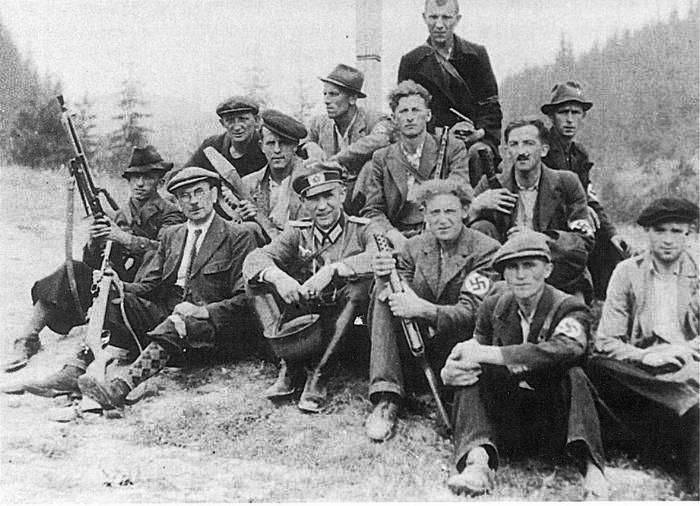
Given the difficult situation in the Polish liberated territory, to ensure the fight against sabotage and reconnaissance groups and gangs, a consolidated division for the protection of the rear of the Soviet units in Poland as part of the 5 regiments was formed.
The situation required constant vigilance and full exertion from the personnel of the HERE to perform complex and multifaceted tasks. For example, during the Belarusian operation in July-August 1944, parts of the BOT 2 of the Belarusian Front (13, 172, 332 of the frontier regiment and 103 of the separate maneuverable group) conducted an 43 combat. In the period of the Vistula-Oder operation of the BOT of the 1 of the Belorussian Front, 102 sabotage groups were eliminated and the enemy battalions were crushed by 14 enemy forces.
The forces of the NKVD to protect the rear in the Berlin operation, during the completion of the defeat and surrender of fascist Germany, effectively carried out their tasks. Only in parts of the Belarusian National Front 1 from mid-April until 2 on May 1945, 118 of terrorist groups were eliminated, 18 of small garrisons were destroyed, more than 12400 of fascists were destroyed and captured. And the 105 frontier regiment together with the units of the 150 rifle division stormed the Reichstag in a general manner.
The personnel of the HERE of the acting army detained a significant number of enemy intelligence agents in Germany, among them many experienced ones who had a considerable experience in espionage. Thus, the rear guard troops reliably ensured proper order in the front line, in necessary cases helped the local authorities to clear the territory of the gangster detachments, and contributed to the early defeat of the enemy.
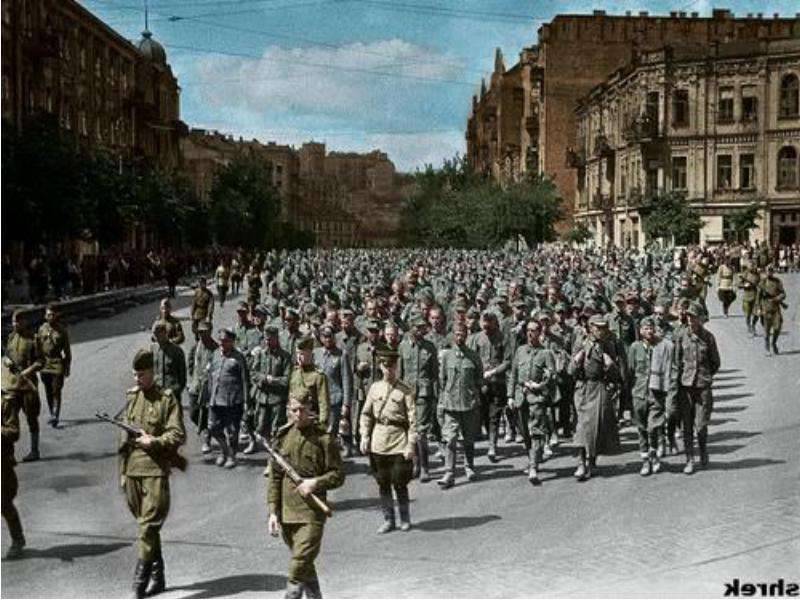
Sources:
The team of authors. Border troops during the Great Patriotic War 1941 - 1945. M .: SCIENCE, 1968. C. 504-505, 511, 520-532.
Zyplin V. NKVD troops in the liberated countries of Europe (1944-1945). // Troop herald. 2006, No. 1. C.18-22.
Chugunov A.Ohrana rear forces in operations to liberate the countries of central and south-eastern Europe / / VIZH. 1976. No.1. C. 89-93.
Tsyplin V.G. Specificity of service and combat missions of the NKVD troops in Europe. // Modern Eurasian Studies. 2014. No.3. C. 40-44.
Belozerov B. Front without borders. 1941-1945 SPb .: RDK-PRINT, 2001. C.201-212.
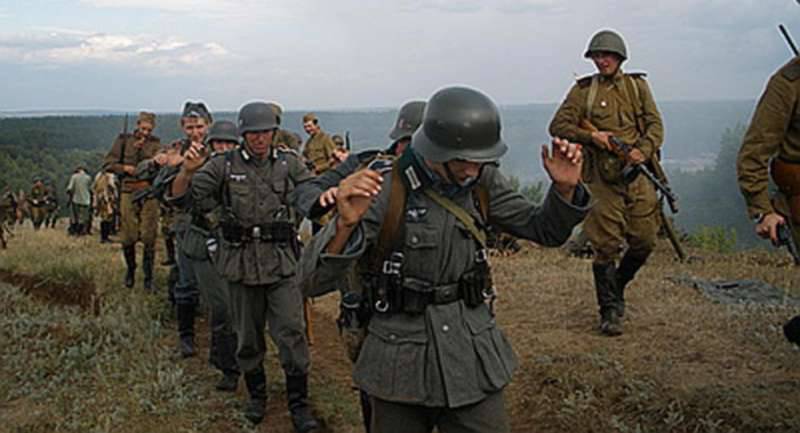
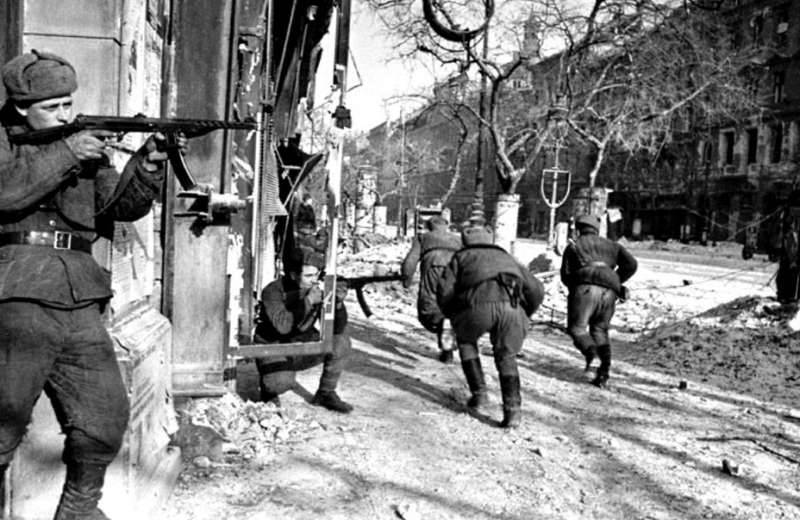
Information